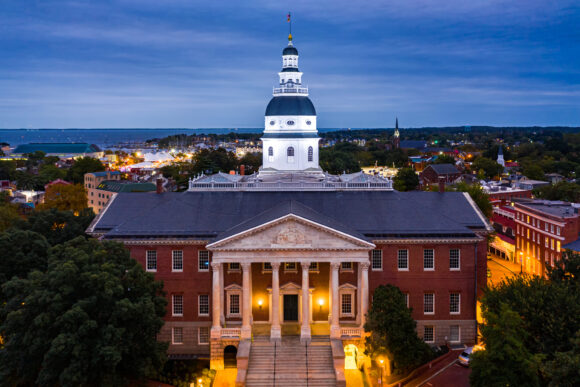Maryland lawmakers enter the last day of their legislative session on Monday with most high-profile measures already passed into law, including tax relief, a paid family leave program and an extensive measure aimed at slowing climate change.
Democrats, who control the legislature, and Republican Gov. Larry Hogan already have signed a bipartisan budget deal with nearly $1.86 billion in tax relief over five years for Maryland retirees, small businesses and low-income families in a year of enormous budget surplus for the state’s $58.5 billion budget.
The deal included a tax credit as an incentive for employers and businesses to hire and retain workers from underserved communities and sales tax exemptions for child care products such as diapers, car seats, and baby bottles, and health products for dental hygiene, diabetic care and medical devices.
“I think we’ve gotten some remarkable work done,” Senate President Bill Ferguson, a Baltimore Democrat, said after session on Saturday. “We’ve passed an incredible budget that invests in Maryland, gives money back to taxpayers, invests in seniors and working families.”
They also agreed on a one-month gas tax suspension to provide about $100 million in additional relief from high prices at the pump. Lawmakers decided against extending the suspension, which expires at the end of the week.
Democrats still had their disagreements with the term-limited governor, who is in his last year in office. They needed to get priority bills to him early in order to override them while still in session — a strong incentive for getting the bulk of their priorities already passed. Since this is the last year of the term before elections, bills vetoed by the governor after the legislature adjourns can’t be overridden next year.
Lawmakers overrode Hogan’s veto on Saturday to create a paid family leave insurance program that has been discussed for years in the state. Maryland workers will be able to take up to 12 weeks of partially paid leave to deal with such family issues as having a baby, caring for a sick relative or dealing with a military deployment. Up to 24 weeks could be taken in some cases, such as when someone who took 12 weeks due to an illness has a child later.
They also overrode the governor’s veto of legislation to expand access to abortion in the state. Maryland will end a restriction that only physicians perform abortions, enabling nurse practitioners, nurse midwives and physician assistants with training to perform them.
Lawmakers passed a broad measure aimed at slowing climate change. Hogan said Friday he would let the bill go into law without his signature. The “Climate Solutions Now Act of 2022” speeds up Maryland’s current goal of reducing greenhouse gas emissions from 40% of 2006 levels to 60% by 2031. It also sets a goal of achieving carbon neutrality by 2045 in the state.
Lawmakers also approved a constitutional amendment to legalize recreational marijuana in July 2023, giving the final decision to voters in November. A measure lawmakers passed to take initial steps toward implementation went into law without Hogan’s signature. Licensing and taxing issues will be taken up next year, if voters approve.
Legislators and the governor also agreed to a new congressional map for the state, after a judge struck down the map approved by lawmakers over Hogan’s veto in December as a “product of extreme gerrymandering.” The General Assembly redrew the state’s eight U.S. House districts to be more compact, and Hogan signed the measure last week.
A measure to ban so-called “ghost guns,” which do not have serial numbers, is going into law without Hogan’s signature. Lawmakers overrode Hogan’s veto of a bill to require firearms dealers to have certain security measures in place as stores.
The General Assembly also approved juvenile justice reforms. Lawmakers overrode the governor’s veto of a bill that prohibits a law enforcement officer conducting custodial interrogation of a child, unless the child has consulted with an attorney.
Lawmakers are still working on details related to enhancing the state’s cybersecurity defenses.
“We have to finish out cyber on Monday, but I think there’s large agreement so that’s probably one of the biggest issues that’s outstanding,” Ferguson said Saturday.
Photo: Maryland State House, in Annapolis, at dusk.
Topics Cyber Maryland Cannabis Employee Benefits
Was this article valuable?
Here are more articles you may enjoy.



 Experian Launches Insurance Marketplace App on ChatGPT
Experian Launches Insurance Marketplace App on ChatGPT  How One Fla. Insurance Agent Allegedly Used Another’s License to Swipe Commissions
How One Fla. Insurance Agent Allegedly Used Another’s License to Swipe Commissions  Preparing for an AI Native Future
Preparing for an AI Native Future  CFC Owners Said to Tap Banks for Sale, IPO of £5 Billion Insurer
CFC Owners Said to Tap Banks for Sale, IPO of £5 Billion Insurer 

